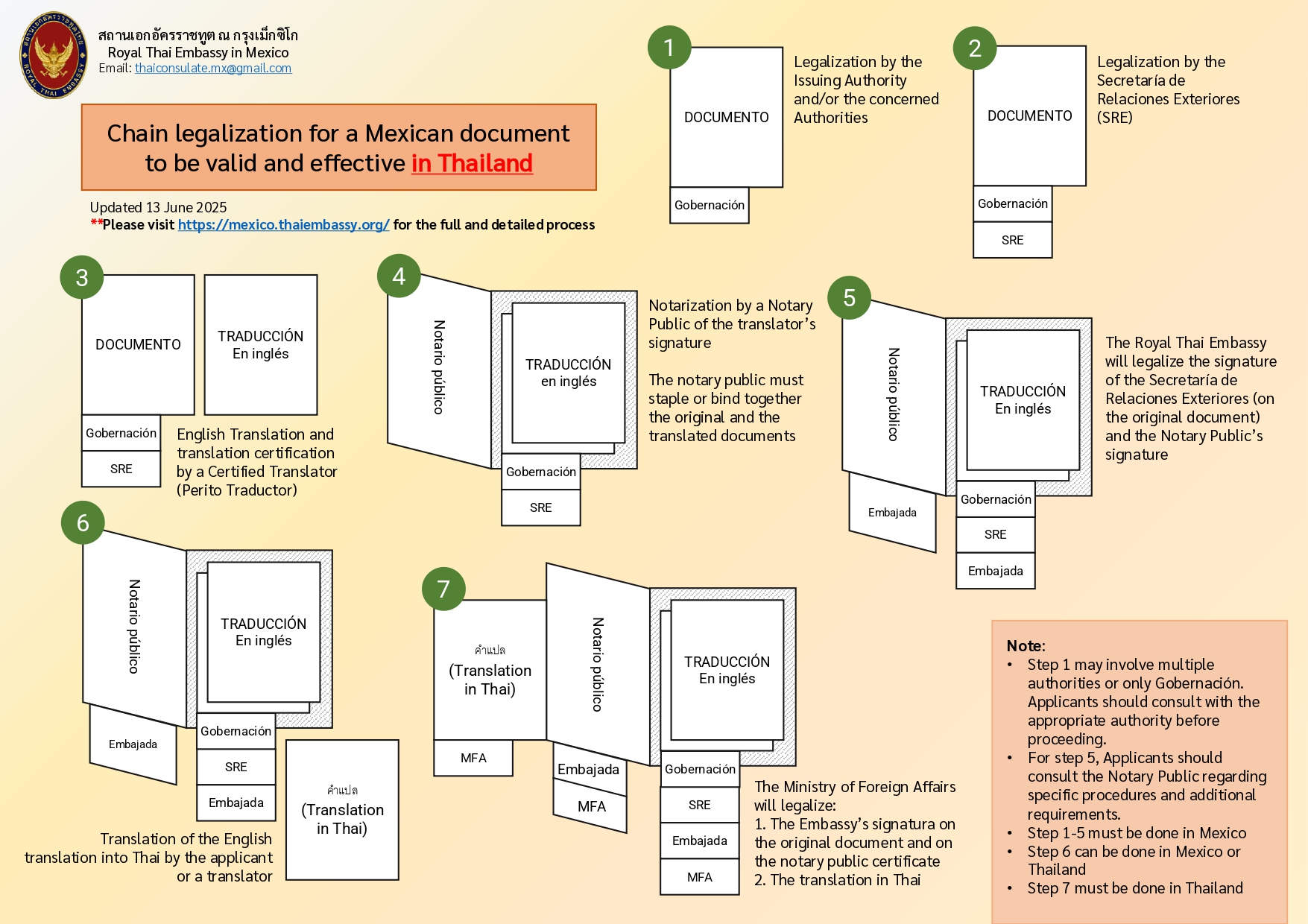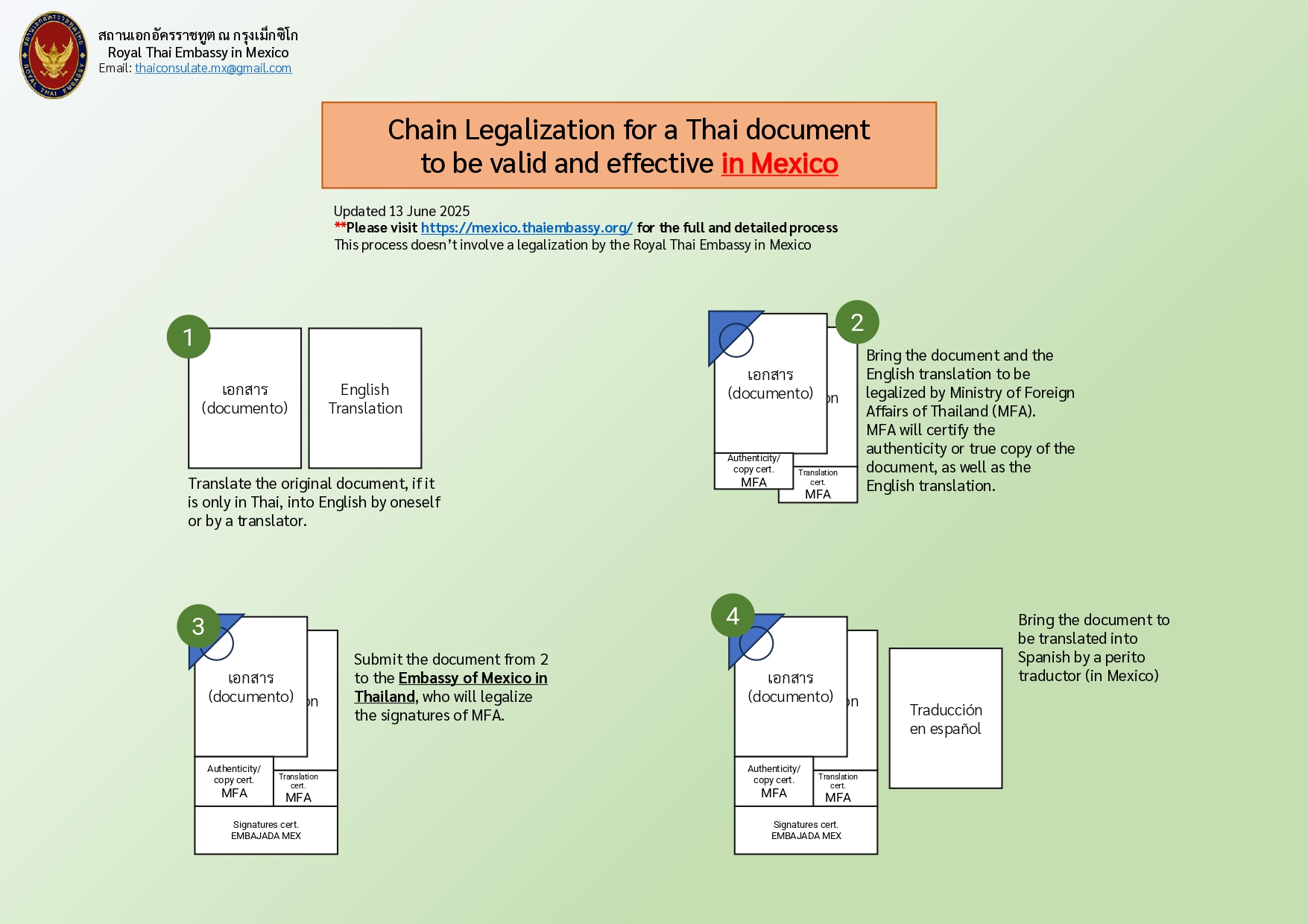Visa and Consular Services
Visa and Consular Services
Legalization
Legalization
วันที่นำเข้าข้อมูล 23 Mar 2023
วันที่ปรับปรุงข้อมูล 13 Jun 2025
Foreign public documents intended for use in Thailand, as well as Thai public documents intended for use abroad, must undergo a legalization process.
Apostilled documents are not valid in Thailand, as the apostille—a mechanism that grants international validity to public documents—is only recognized among member countries of the Hague Apostille Convention, a convention to which Thailand is not a party.
In this context, the applicable procedure for document validation is the chain of legalizations.
This document verification and certification process generally requires processing with various entities, as well as the corresponding translation. If you have any questions, we recommend contacting us by email, attaching a scanned copy of the document in question, to avoid inconveniences or rejections during the process.
Mexican public documents to be used in Thailand
Complete process

- Legalization by the issuing Authority and/or other concerned Authorities, finally by the Gobernación
This step must conclude with a legalization by the Secretaría de Gobernación.
The applicant must bring the original document to the authority responsible for its issuance in order to begin the legalization process. Depending on the type of document, this may involve one or more authorities.
Applicants are strongly advised to consult either the issuing authority or Gobernación to confirm the exact steps and required legalizations before proceeding to Step 2.
- Example A: A Free Sale Certificate may require only legalization by Gobernación in this step.
- Example B: A Birth Certificate, or other documents issued by Civil Registration Office, may need to be legalized first by Secretaría del Gobierno (estatal, issuing of the document) and then by Gobernación (federative).
- Legalization by the Ministry of Foreign Affairs (SRE)
Submit the document legalized in the previous step to the Ministry of Foreign Affairs (SRE - Secretaría de Relaciones Exteriores). The SRE will certify the signature of the official who performed the previous legalization.
- Translation into English by a Perito Traductor
Once the document has been legalized by the SRE, it must be translated into English by a perito traductor (sworn translator). The translator must also prepare a translation certificate, but must not sign it yet.
The perito traductor must sign the certificate in the presence of a Notary Public in the next step.
It is advisable to confirm in advance whether the perito traductor is available and willing to appear in person before a Notary Public to sign the certificate.
- Notarization of the translator's signature by a Notary Public
Take the legalized document (from Step 2) together with the English translation and unsigned translation certificate (from Step 3) to a Notary Public. The Notary must legalize the signature of the translator, which means the translator must sign the translation certificate in the presence of the Notary.
The Notary must then staple or securely bind the original document and its translation together in a manner that prevents them from being separated.
Note: It is strongly recommended to consult the Notary Public in advance regarding any specific procedures or additional requirements.
- Legalization by the Royal Thai Embassy
Submit the bound set of documents from step 4 to the Royal Thai Embassy. The Embassy will authenticate both the SRE's signature on the original document and the Notary Public's signature.
Please see below for the information about the legalization process provided by the Royal Thai Embassy.
- Translation into Thai language
Translate the English version of the document into Thai. This can be done either by the applicant themselves or by a translator.
- Final legalization in Thailand by the Ministry of Foreign Affairs (MFA)
Submit the Thai translation along with the bound set of documents from Step 5 to the Department of Consular Affairs or the Legalization Office in Thailand for final legalization. The MFA will certify the signature of the Embassy on the original document and on the Notary Public certificate, as well as legalize the Thai translation of the document.
- Instructions for legalization: consular.mfa.go.th – Legalizations
- Department of Consular Affairs Telephone: (+66) 02-5728 6442
- Website: consular.mfa.go.th
- Offices that offer legalization services: See full list
Note: Steps 1-5 must be done in Mexico. Step 6 can be done in Mexico or Thailand. Step 7 must be done in Thailand
Legalization process by the Thai Embassy in Mexico
Once step 4 is completed, the applicant must send a copy of the document to the Embassy's email address. The Embassy will verify the document's completeness and provide the necessary steps to proceed with its legalization.
The legalization service costs USD 15.00 per signature legalized. Payment details will be provided by email once the Embassy confirms that the document meets the requirements.
No payments should be made without prior instruction from the Embassy. Payments made are non-refundable under any circumstances.
Thai public documents to be used in Mexico

In this context, legalization by the Thai Embassy in Mexico is not required.
- Obtain the document in English or translate it into English
If the original document is in Thai, you will need to translate it into English yourself or have it translated by a professional translator.
Use: It is possible to request copies of certain Civil Registry documents in English at district offices (สำนักงานเขต/อำเภอ). - Legalization by the Ministry of Foreign Affairs of Thailand (MFA)
Please take the original document and its translation (if applicable) to the Department of Nationality and Legalization, located in Chaeng Watthana, or to certain passport offices in Thailand.
The Ministry of Foreign Affairs (MFA) will authenticate the original document and, if applicable, the translation as well.
- Instructions for legalization: consular.mfa.go.th – Legalizations
- Department of Consular Affairs Telephone: (+66) 02-5728 6442
- Website: consular.mfa.go.th
- Offices that offer legalization services: See full list
- Legalization by the Mexican Embassy in Thailand
Submit the document legalized in the previous step to the Mexican Embassy in Thailand, so that it can certify the signatures and seals of the Thai Ministry of Foreign Affairs.
- Embassy of Mexico in Thailand
- Website: embamex.sre.gob.mx/tailandia
- Dirección: 11th Floor, Unit 1101, Q House Lumpini Building, 1 South Sathorn Rd., Thungmahamek, Sathorn, Bangkok, 10120
- Telephones: (+66) 02 006 0734 / 02 020 0735 / 02 050 0736 / 02 060 0737
- Emails: [email protected], [email protected]
- Translation into Spanish by an expert translator
Once the document has been legalized by the Embassy, it must be translated into Spanish by a certified translator authorized by the Superior Court of Justice of the Mexican state where the document will be presented. - Delivery of the document in Mexico
Once the document has been completed in step 4, it can be delivered to the corresponding unit or recipient in Mexico.
EMBAJADA REAL DE TAILANDIA EN MEXICO
Mon - Fri 10.00 - 16.00 hrs. Visa and Legalization 10.00 - 13.00 hrs.